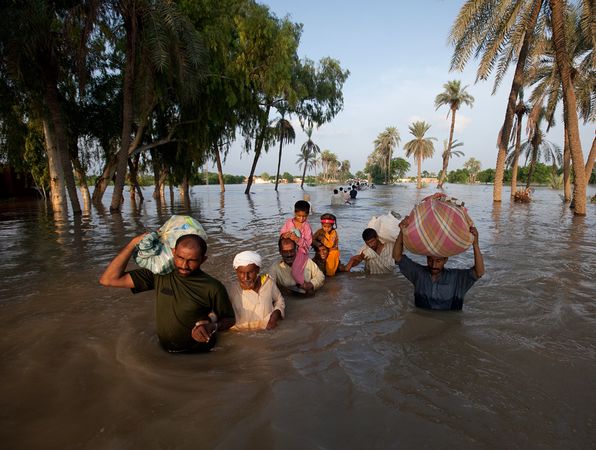By ~ Mala Balaji, Researcher - Environment and Climate Action
Climate injustice is a topic that has started gaining momentum in the recent past, thanks to climate activists. But what exactly is climate injustice? In order to get a basic idea about what it actually means, we need to start analysing retrospectively. For instance, what is climate change, who causes it, who gets hurt by it and so on and so forth.

Photo source: Think Progress
Fundamentally, climate injustice is a multidimensional issue. It highlights how the brunt of climate change is disproportionately faced by different nations and different people. The world is coming to accept that greenhouse gas emissions due to human activity is the main reason why we are being pushed towards an impending climate crisis. Nations are making a conscious effort to aggressively shift towards clean energy solutions. However, the problem with greenhouse gas emissions, especially carbon, is that it remains trapped in the atmosphere for centuries.
The disproportionate and incongruous contribution of emissions by various countries highlights the dynamics of climate inequality. Since 1850, a whopping 2400 gigatons of carbon dioxide has been released into the atmosphere mostly because of human activities. If we further analyse the world's cumulative emissions thus far, India is comparatively less guilty. According to ourworldindata.org, as of 2019 the United States of America has a cumulative global carbon emission of 25.46 percent, in contrast to India, which has a mere share of 3.22 percent despite being home to 17.8 percent of the global population. However, in terms of facing the brunt, India is unfortunately considered to be among the world’s top five countries that are most vulnerable to climate change. Furthermore, as per a report by Oxfam International, 1 percent of the world's richest are responsible for more than twice the carbon pollution emitted by 50 percent of the world's poorest who constitute roughly around 3.1 billion people. This is climate injustice in simple words; but there is even more to it.
Shifting the focus to India, it is considered one of the fastest growing economies in the world. There is said to be a six fold increase in the median annual income since 1990. Yet, according to the United Nations, around 364 million people, which accounts for almost 30% of the total population, live below the poverty line. This paradox of increase in India’s median annual income to that of more people being pushed to live below the poverty line blatantly suggests one unsettling yet straightforward fact. The rich are getting richer and the poor poorer. This is further reiterated in a study by Oxfam which states that the top 10% of the Indian population holds 77% of the total national wealth. To add to it, inadequate access to health care is becoming a major cause of concern. The economically disadvantaged and marginalized people are finding it difficult to cope with the rising cost of healthcare as a result of which almost 2 people every second, which amounts to 63 million of them, are being pushed to poverty every year.
Climate change is one of the major factors posing a serious challenge to alleviating poverty in India. We are already facing the brunt of climate change with extreme heat waves, droughts, heavy rainfalls, severe flooding, catastrophic storms and rising sea levels. Further breaking it down, May 2021 saw cyclone Yaas leaving a mass trail of destruction in the eastern coast inundating many villages which left over 1,50,000 people homeless. In the same month, on the west coast, cyclone Tautktae caused immense damage ripping out power pylons, trees and causing house collapses killing at least 29 people. Other natural disasters like the glacier burst in Chamoli and cyclone Amphan in West Bengal reeked of massive destruction. Apart from this, India is witnessing a decline in agricultural productivity, rampant heat waves, rising sea levels and acute water scarcity, resonating the catastrophic effects of climate change loud and clear.
One common fact that comes out of these natural calamities is that the poor and vulnerable are the worst affected and account for most of the casualties. This substantiates the fact that the cost of climate change is not borne equally. It hurts the low income and marginalised sections of the society the most. The disproportionate and flagrant bias against the country's poorest is what climate injustice is all about.
India's economy is ailing because of climate change, setting back its economic growth by a good 30 percent. As per a paper titled “The cost of climate change in India” by the global think tank ODI, India is said to lose 3 percent of its gross domestic product (GDP) at 1°C of global warming. It further suggests that India’s national poverty rate would increase by 3.5 percent by 2040. Consequently, this would cause an additional 50 million people to live below the poverty line at the very least, considering an optimistic zero-warming scenario.
In order to avoid further climate injustice to the poor and leave behind a liveable planet for the future generations, we need to implement radical changes. First and foremost, polluting countries should take urgent steps to put a tap on their greenhouse gas emissions. They should be held accountable and should pay reparation for using up more than their share of emissions. On the home-front, India needs to reduce its coal dependency and should focus on a just-transition towards clean energy. This will lead to immediate benefits like cleaner air, greater energy security and rapid job creation. Decarbonizing the agricultural sector by promoting a shift to plant-based protein from animal protein, improving farming practices and promoting sustainable forestry could contribute towards achieving India’s Sustainable Development Goals (SDGs). In addition to the much needed systemic changes, reorienting ourselves towards a more sustainable lifestyle will be highly impactful. We need to act now while we have the voice and resources before climate change reaches the tipping point. Afterall, justice delayed is justice denied.

